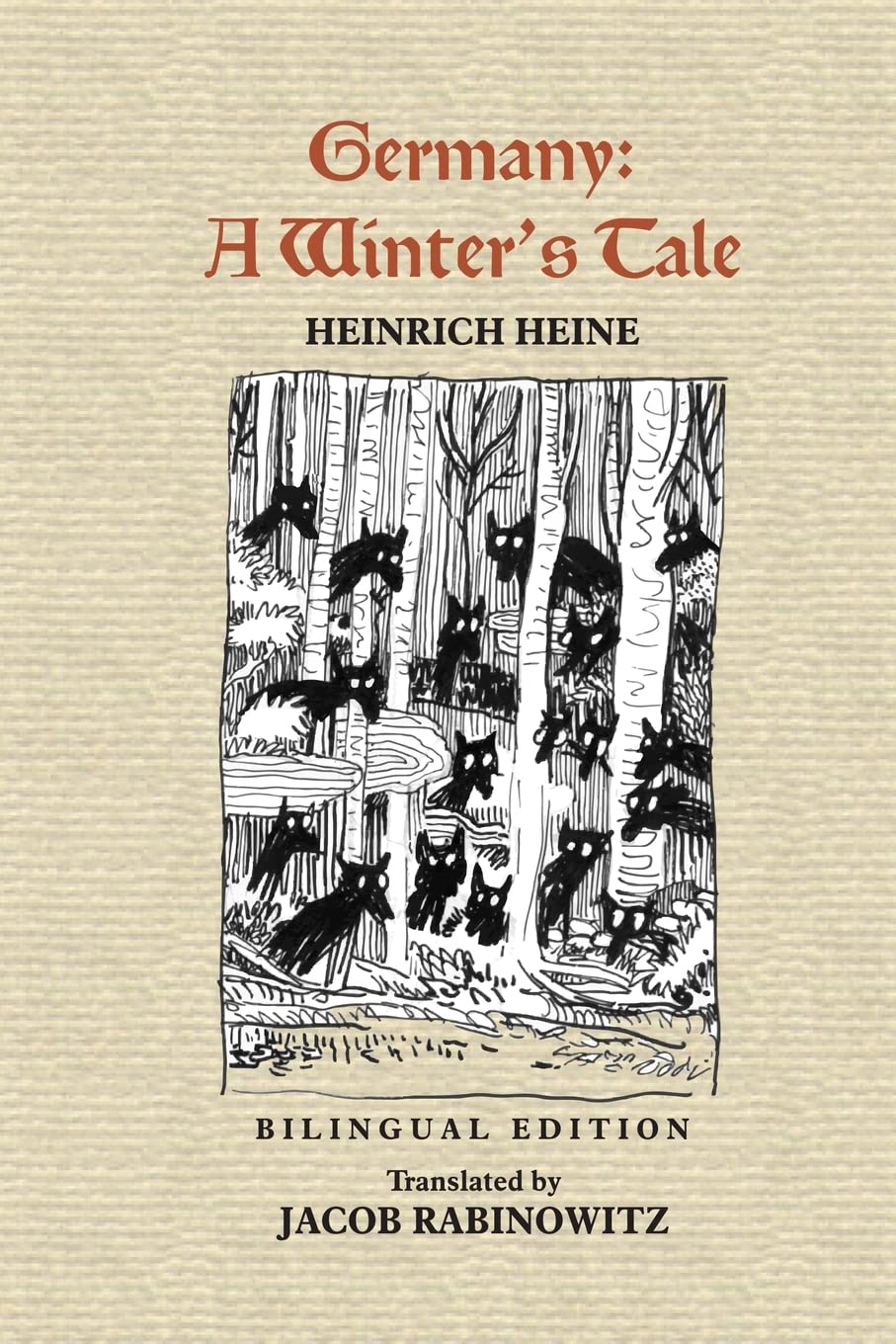
Germany: A Winter’s Tale
Heine’s Hallucinatory tour through German history and mythology; facing page German text. Translated by Jacob Rabinowitz
canto 26: Heine and the goddess Hammonia
The cheeks of the goddess glowed so red, the rum must have gone straight
to her crowned head, and she said to me in a dire, gloomy voice:
“I’m getting old. I was born on the day the city of Hamburg was founded
My mother was Queen of Shellfish here at the mouth of the Elbe.
My father was Charlemagne, a monarch greater and wiser
than even the present king of Prussia. The throne on which he sat
to be crowned Emperor in the year 800
now stands at Aachen. The throne on which he sat in the night
my mother, the good goddess, inherited, passed on to me.
An unprepossessing article of furniture perhaps,
yet I wouldn’t trade it for all Rothschild’s gold.
You see there in the corner an old battered chair?
The leather of the armrests is cracked, the upholstery gnawed by moths.
Just go over there, lift the cushion from the seat,, you’ll see a round opening
and under it a cauldron, a magic pot
where strange forces brew. Stick your head through the hole
and you’ll see the future of Germany figured in weaving
phantasmal shapes.
“Now don’t be scared if a little miasma
rises out of the chaos of possibilities.”
So she spoke,and laughed peculiarly. Undaunted, I hastened
to poke my curious head through the fearful aperture.
Now I can’t betray the vision: I promised never to tell
what I saw, however it’s possibly permissible
to say — O God! — what it smelled like.
I struggle with strong aversion
just to make myself call to mind the vile, accursed,
olfactory prelude:
the poverty-smell of old cabbages
together with the despotic scent of Russian leather,
the kind they use to make knouts. But even more horrible
was the odor that next arose. If all the dungheaps
in the 36 stalls Hercules mucked were raked up at once
it might have smelled like that: a vast Biedermaier
Augean stable of all the reactionary crap
that’s collected since Napoleon fell. It brought to mind the words
of the French revolutionary St. Just to the Public Safety Committee:
“You can’t treat a mortal disease with just a spritz of perfume.”
But the scent of this German future outsoared anything my nose
had ever imagined possible. Unable to endure it
I fainted. When I opened my eyes I sat by the goddess again,
my head lay on her wide bosom.
Her face was red, her eyes flashed,
and her nostrils flared. She grabbed this poet, impetuous as a bacchante,
and sang in fearsome ecstasy:
“I love you, stay with me in Hamburg.
we’ll eat and drink the wine and oysters of the present
forgetting the dark future. Put the lid down
so its nasty smell won’t dampen our joy. I love you as much as ever
woman loved German poet! As I kiss you I feel the thrill
of your genius. A marvelous drunkenness overcomes my soul.
I seem to hear the night watchmen singing below in the streets
a wedding anthem for us, sweet companion of all my joys!
The city senate’s guardsmen appear, grave and impressive
with torches held aloft. They honorably discharge
their duties by performing a festival torch-dance
with gambols, leaps and wiggles. Here’s the sage and solemn senate itself,
the council of aldermen, the mayor clearing his throat
— he’s prepared a little speech. The diplomats appear
in dazzling formal full-dress to present, with becoming reserve,
their congratulations in the name of the neighboring states.
And here, representing the spiritual authority
is a deputation of rabbis and priests. But, oh no! here’s Hoffman
the censor, brandishing his scissors! They open and shut
with a shrill whisper of steel drawn across steel.
The fellow is furious! He lunges for your body —
metal cuts flesh — the very best part is — expurgated.